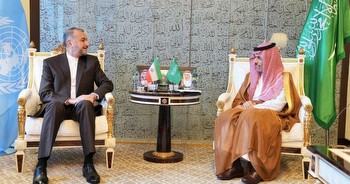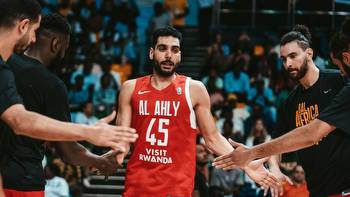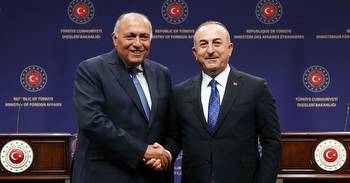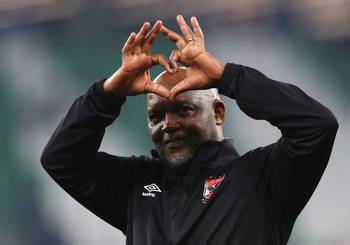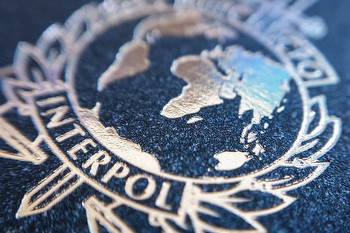30 days in prison
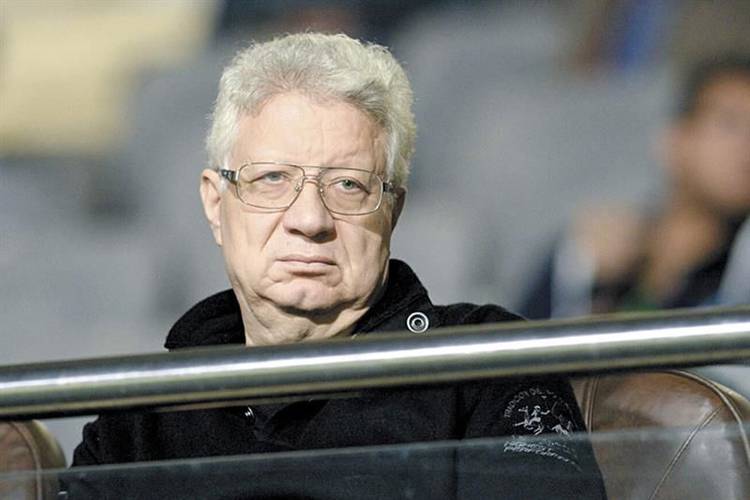
He is bombastic. He’s vulgar. And he is a loose cannon, writes Alaa Abdel-Ghani
For all of the above, he is also now in jail.
Zamalek President Mortada Mansour was sentenced to one month for defaming his Ahly club counterpart and crosstown rival Mahmoud Al-Khatib.
Mansour turned himself in to authorities on Saturday 25 February. He had initially arrived in court to appeal the sentence but it was rejected and he was put in custody, the latest chapter in the non-ending saga of this notorious public figure whom Egyptians have never seen the likes of before.
Having lost two defamation lawsuits brought to court by Al-Khatib in August last year, Mansour was initially sentenced to a year behind bars before the court lessened the sentence to 30 days.
“Finally, the president of Ahly jailed the president of Zamalek for the first time in the history of the sport,’’ Mansour wrote on social media following the ruling.
“The plan was to overthrow me…. I had to completely disappear from the political, sports and media scene at any cost”.
In truth, nobody ‘’overthrew’’ Mansour; he did it all himself. The lawsuit slapped on Mansour by Al-Khatib included 12 video clips of Mansour insulting and defaming Al-Khatib, his family, members of the Ahly board and its executive director.
Mansour will be jailed for only 30 days but the aftereffects on the football squad and other Zamalek sports could be much longer.
While Mansour has gone to jail, the real loser stands to be Zamalek. Although it is a sports club, its football team is its most prized asset and gives the club its famous name. But the squad has fallen on hard times. In the league, which Zamalek have won the past two years, they are currently languishing in fifth place, eight points behind leaders Ahly who have played two games less.
They were also knocked out of the Egypt Cup in which they were the defending champions and look in danger of embarrassingly exiting the African Champions League in the group stage for a third successive time.
No one can say for sure whether the court ruling will have an effect on the team but it’s hard to imagine stability reigning in the middle of Mansour’s three-ring circus.
A former MP and full-time showman, Mansour is a lawyer by training but ironically has tangled several times with the law and repeatedly collided with officialdom. In 2005, the government forced him from office after he waved his shoe – a disrespectful gesture in the Arab and Islamic world – in the presence of an aide to the then country’s president Hosni Mubarak.
In 2007, he was sentenced to three years in jail for “insulting” court officials, levelling accusations of corruption against them, and trying to storm the office of the head of a judicial body.
Mansour was one of several figures who was accused of orchestrating the Battle of the Camel, when pro-Mubarak thugs rode camels and horses into Tahrir Square on 2 February, at the height of the 2011 revolution, and attacked protesters, killing 11 and injuring several hundred. He and 24 other Mubarak-era figures were acquitted in 2012 on charges of inciting the violence.
Mansour’s a weird fellow. In 2014, he pulled out of Egypt’s presidential race after he said he had received a sign from God that former army chief Abdel-Fattah Al-Sisi would win.
He claims he has 13 personalities, a Gemini feature, in his telling. Which Mansour persona will appear at any one time is anybody’s guess.
He believes that black magic was responsible for Zamalek’s losses in African tournaments.
He goes to TV talk shows armed with stacks of documents to prove a point when a simple ‘yes’ or ‘no’ answer would suffice. In the process, he shouts down all who disagree with him.
Whether he is being doused in urine - he says it was acid - as he was a few years back, or escaping an assassination attempt when he was shot at by fans of his own club, to say Mansour is controversial does not do justice to the word.
He has ruffled plenty of feathers. He once hoped on live TV that the wife of the former emir of Qatar would get cancer when Egypt’s ties with the Gulf state were frayed.
He constantly accuses Ahly, without evidence, of manipulating the Egyptian Football Association to fix schedules in their favour. In January and probably in response, the EFA announced a halt to any further dealings with Mansour mainly due to his ‘’transgressions” against the association’s officials.
His belligerency has landed him in gallons of hot water. Despite being a bonanza for TV ratings and newspaper readership, in 2015 Mansour was collectively banned by hundreds of Egyptian journalists who took an informal pledge to refuse to mention him by name in print or on air for three months.
In 2018 he was suspended for one year and fined $40,000 by the Confederation of African Football (CAF) after verbally abusing the CAF president for not punishing Ahly fans who criticized a four-year Saudi sponsorship deal with the club (that same year Saudi Arabia terminated the arrangement).
With Mansour around, no mom is safe. His swearing must always include somebody’s mother. The profanities – including calling former Zamalek forward and current Ahly player Mahmoud Abdel- Moneim Kahraba, a monkey, a dog and a tramp – cannot all be printed.
To those who are not familiar with Mansour, he is the mirror image of Donald Trump: the same loudmouth, brashness and pompousness who seldom apologises, only multiplied.
On the other hand, Mansour is the antithesis of Al-Khatib, soft-spoken and mild-mannered, an icon of Egyptian football in the 1970s and ‘80s and widely regarded as one of the best players in African football history.
Al-Khatib, president of Ahly since 2017, remained virtually silent in the face of Mansour’s verbal onslaughts, preferring to take the feud to court.
The pair had previously taken each other to court, clashing over the title “African Club of the Century” which CAF bestowed upon Ahly when Mansour believed the epitaph belonged to Zamalek,
But this time Mansour finds himself wearing prison stripes.
It is not clear what the future holds for Mansour and Zamalek. Sports clubs in Egypt reportedly consider that jail disqualifies a person from holding any office in sports clubs.
But Mansour has been in and out of the Zamalek presidency five times starting in 2005 and most recently, despite his brushes with the law, regained the top job courtesy of a court ruling in October two years ago.
In spite of his many enemies and detractors, Mansour, 70, has his supporters, none more so than those who voted for him in successive club elections.
On Monday, Zamalek elected board member Suleiman Wahdan as interim president. The club did not say how long Wahdan’s tenure would be, however, a lot of people would not be surprised to see Mansour back, acknowledging his longevity and ability to beat the odds.
Mansour’s term expires in 2025 and he did not seem perturbed by the sentence. One month behind bars is not too stringent a punishment.
‘’Don’t worry about me,’’ Mansour wrote in his departure message. “Lions are not afraid of death, and they are not afraid of being imprisoned either.”
* A version of this article appears in print in the 2 March, 2023 edition of Al-Ahram Weekly









